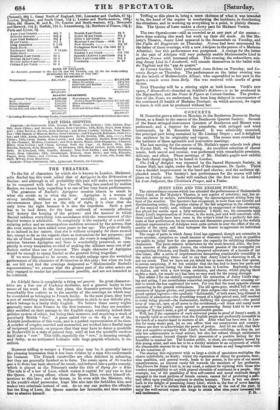JENNY LIND AND THE ENGLISH PUBLIC.
The extraordinary success which has attended the performances of Mademoiselle Jenny Lind, at Her Majesty's Theatre, is now matter of notoriety.; nay, her at- traction seems to endure, notwithstanding the discouragement arming from the heat of the weather. The Spectator has recognized, in more than one tasteful and discriminating notice the genuine claims of the fair songstress to the admiration of the musical world; and, without indulging in exaggerated or fulsome eulogy, has placed her merits upon a lofty eminence. I think' too, his comments upon Jenny Lind's impersonation of Norma, in the main, just and well conceived: still, there could hardly have been room in the writer's mind for a perfectly fair esti- mate of that performance, for the vexation and discontent generated by the wofnlly deficient representative of Adalgisa were quite certain to sour the effect of the en- semble of the opera, and thus indispose the hearer to appreciate its individual beauties at their full value.
The range of parts in which Jenny Lind has appeared, though not extensive in
mere number, comprises no small amount of dramatic variety, such as qualifies the public to judge how far she possesses the capacity for exhibiting dissimilar characters. The pions mission undertaken by the stout-hearted Alice, the love- sick sorrows of the gentle Amine, the vehement passion of the revengeful yet sympathizing Priestess, and finally the chequered adventures of a heroine of our own times, offer a series of impersonations demanding considerable versatility in the artist attempting them: and to Ray that Jenny Lind is charming in all, is not too much. That we have not yet beheld her in more than these four operas, is nowise surprising, if we but consider that she has had to learn her parts and rehearse the operas during the time she has been in London. Beginning to sing in Italian, and with a new troupe, orchestra, and chorus, whilst playing three nights a week, (or nearly so,) has been no easy work for the young stranger. But whilst I for one entirely comprehend the attraction of Jenny Lind's sing- ing and acting, I am nevertheless somewhat surprised to observe the amazing ex- tent to which she has captivated the town. For you find the most opposite classes concurring in the general enthusiasm. The old opera-goer, stuffed fall of remi- niscences of bygone glories, and jealous of their eclipse—the crusty critic, on his guard against raptures—the apathetic "fashionable, " of both sexes, long disused to emotions of admiration—the grumbling tenant of ahigh-priced seat, half readied to resist being pleased—the malecontent, disliking the management—the genial lover of true art, open at all pores to the ravishment,—all these and many more varieties of "the public," seem agreed in pronouncing Jenny Lind to be a new coinage of Nature's mint, a girl of unquestionable genius. Well, but if the expression of such universal praise be proof of Jenny's merit, it is equally valid as an evidence that the English people are profoundly accessible to the touch of a master-hand in matters of art. lifter what has been seen in Lon- don for many weeks past, let no one affirm that our countrymen and country- women are slow to acknowledge the power of genius. And let me add, that their nice and sensitive sympathy with Luid's best efforts—relishing, as they do, not only her achievements in vocal science, but also her refined though unobtrusive passages—attests beyond dispute their possession of a positive feeling for the beautiful in musical art. The London public, in short, are exquisitely moved by this young artist, and own her to be a worthy minister to an enjoyment of which the pleasurable sources lie as deep in the human bosom as any imaginative vein we are conscious of.
The sharing this enjoyment with so large a circle of spectators multiplies the charm indefinitely, no doubt; whilst the reputation of Jenny for goodness, femi- nine qualities, and general worth, lends to her person, in the eyes of our moral countrywomen, an interest rarely felt towards the members of her profession. The furore for Jenny Lind is, to my mind, a subject for rejoicing with those who connect susceptibility to art with general elevation of sentiment in a people. Her example, too, of the possibility of firm self-control and moral rectitude though engaged in the most perilous of female careers, cannot fail of is a salu- tary effect upon youthful aspirants to similar honours. There s but one draw- back to the delight of pess.sssing Jenny Lind; which is, the fear of never hearing her again! For it is certain that she quits the stage at the end of the year, to enjoy the well-earned repose she longs to attain after nine years' incessant


























 Previous page
Previous page